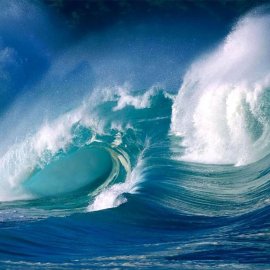Citizens of the Ocean (rebroadcast)
-
English
-
ListenPause
I’m Peter Neill, Director of the World Ocean Observatory. How do we build a new global constituency for the ocean? That is, of course, the purpose of the not-for-profit World Ocean Observatory, to relate the ocean to other things that matter to us – fresh water, climate, food , energy, public health, trade, transportation, international finance, policy, planning, governance, economic development, and cultural traditions—all the human involvement inherent in ocean systems that have direct and indirect implication for our future. Since 2006, the Observatory has done just that: advocated through information and science and provided educational services to an online audience that has doubled every year, a network of some 15,000 ocean-related organizations worldwide and more than 150,000 scientists, educators, policy makers, students, and interested individuals from over 165 countries around the world. As exhilarating as it is to think that W2O, with its tiny operating budget and three person, part-time staff, might effectively engage this growing audience of millions, it is not enough, particularly when I read of things going viral on YouTube and the social networks, things that I may think frivolous but which nonetheless connect and communicate with many, many millions more. This world is connected, not divided, by the sea. Through the circulation of protein, goods, people, and ideas. Storm impact and sea level rise can threaten anytime, anywhere, in a tumultuous instant, making environmental refugees of us all. The ocean contains an enormous, unexplored inventory of medicinal cures, unlimited energy, and the desalinated drinking water that each of us needs in exactly the same amount each day, rich or poor, north or south, to survive. These are not frivolous things. How, then, do we connect and unite “citizens of the ocean” worldwide, a global community whose collective awareness translates into the political will required to change how we understand and use the ocean’s bounty? What do you think? What more can we do? Why not let us know with an email to [email protected]? We’ll start with one or two, and, who knows, maybe we’ll go viral. We will discuss these issues, and more, in future editions of World Ocean Radio. WORLD OCEAN RADIO IS A PRODUCTION OF THE WORLD OCEAN OBSERVATORY, IN ASSOCIATION WITH WERU FM, BLUE HILL, MAINE. WORLD OCEAN RADIO IS DISTRIBUTED BY THE PUBLIC RADIO EXCHANGE AND THE PACIFICA NETWORK. FIND OUR PODCAST ON ITUNES AND AT WORLD OCEAN OBSERVATORY DOT ORG.
The world is connected, not divided, by the sea, through the circulation of protein, goods, people, and ideas. The ocean contains an enormous unexplored inventory of medicinal cures, unlimited energy, and desalinated drinking water. How do we build a new global constituency for the ocean? In this episode of World Ocean Radio, host Peter Neill will explore this idea and ask how we might connect and unite as citizens of the ocean worldwide, and to sustainably benefit from the ocean's bounty.
About World Ocean Radio
Peter Neill, Director of the World Ocean Observatory and host of World Ocean Radio, provides coverage of a broad spectrum of ocean issues from science and education to advocacy and exemplary projects. World Ocean Radio, a project of the World Ocean Observatory, is a weekly series of five-minute audio essays available for syndicated use at no cost by college and community radio stations worldwide. A selection of episodes is now available in Portuguese, Spanish, French, Swahili, and Mandarin, enabling us to reach 75% of the world's population. For more information, visit WorldOceanObservatory.org/world-ocean-radio-global.
- Login to post comments



